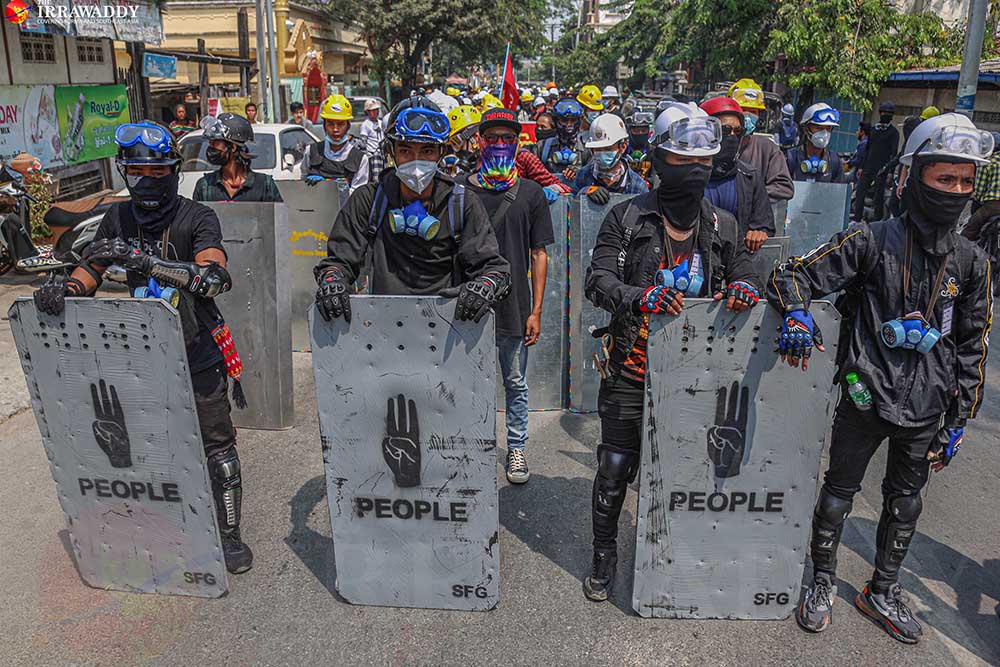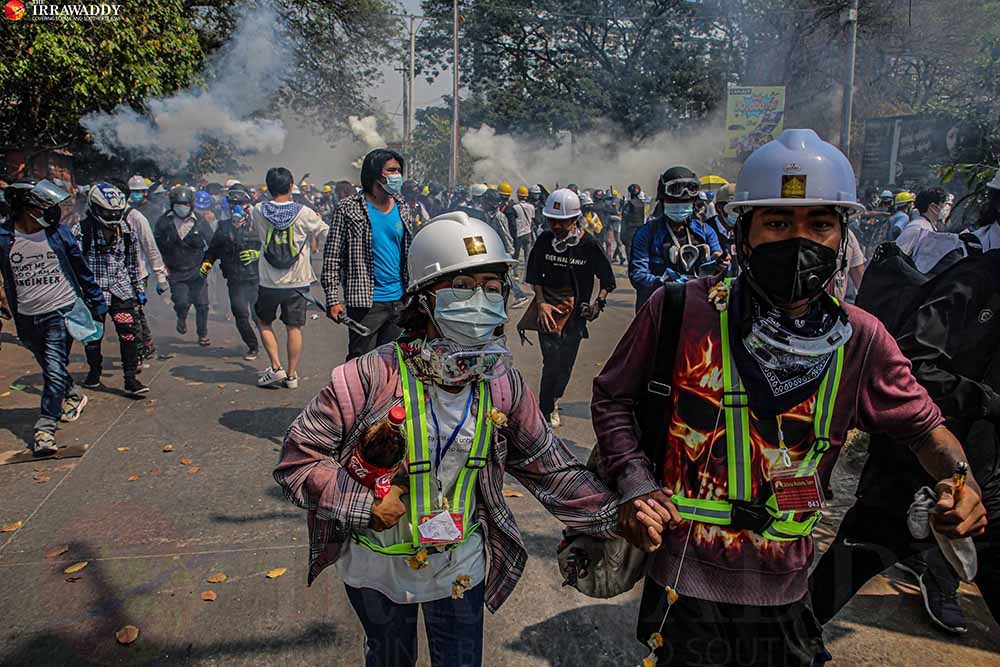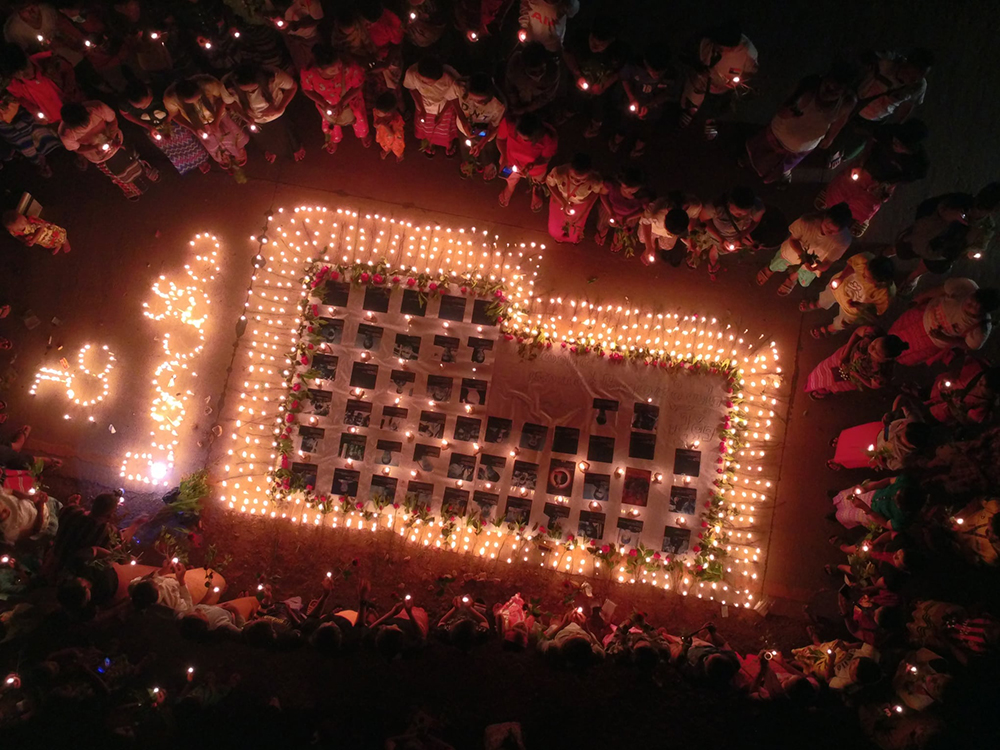The Irrawaddy spoke to Derek Mitchell, the US ambassador to Myanmar from 2012-16, on the unfolding crisis in the country. Mitchell also served as the US State Department’s first Special Representative and Policy Coordinator for Myanmar, with the rank of ambassador. During his tenure, which coincided with the opening up of the country under military-installed President U Thein Sein, Mitchell became one of the best-known and most popular Western ambassadors to serve in Myanmar. He is now president of the National Democratic Institute.
The Irrawaddy: Did the news of the military coup surprise you? The coup took place almost 10 years after acclaimed reforms in the country. The West and US engaged and lifted sanctions on Myanmar, and there was endless good news in the country. What are your thoughts now?
Derek Mitchell: I don’t think anyone who knows Myanmar can ever be completely surprised that the military could do something like this. I was following events leading up to Jan. 31 and was aware of the rumors that the military was frustrated, mobilizing, and might take action. But I will admit I was still stunned when I got word. The pretext was so flimsy for something so profound.
My feelings are overwhelmingly ones of deep sadness and anger over the damage this coup will inflict on Myanmar and its people, and has already inflicted. It is an entirely destructive act. It pulls the country backward to a dark time, and continues wasting its vast talent and potential—for essentially no reason that can be credibly asserted as in the national interest. It’s incredibly tragic.
The Irrawaddy: The military came up with voter fraud allegations against the elected party and government. But now they have bogus charges against the elected government leaders. They have detained many government leaders including Daw Aung San Suu Kyi and President U Win Myint. And now we witness the crackdown, unlawful arrests and detention of NLD leaders nationwide. There have been protests and a civil disobedience movement (CDM) across the country in spite of the crackdown, raids, arrests and detentions. Diplomats abroad joined the CDM. The regime has no legitimacy. We have seen horrifying footage, live streaming of abuses committed by military.
It seems the level of hatred and anger directed toward the military is extremely high. The military is at war with the people. We saw your tweet last week: “The Myanmar military represent brutality, corruption, failure and stupidity in every regard. Their time destroying the country must end.” Quite powerful and emotional indeed.

Derek Mitchell: Yeah, I woke up to stories overnight [in the US] of violence against peaceful protesters and got rather emotional. I wrote the tweet in the vague hope that it might be seen by some in the military and wake them up to how what they are doing is being viewed around the world.
The military has been at war with their own people, as you say. They like to say their goal is national unity. Well, they have achieved that: the people are united in opposition to them and this coup—from every corner, every sector, every part of the country. The military should take heed.
As far as the tweet is concerned, the brutality of the military is indisputable. By “corruption” I meant not just in the narrow financial sense but in broad terms of corrupting the entire economy, society, politics, and overall dignity of the Myanmar people. They operate outside the law, which corrupts, and I would say impedes, the health and well-being of the entire country.
Failure just honestly describes the legacy of military rule. If the military steps out of its bubble, how can anyone there consider their legacy a success since they have failed at everything they claim to want for Myanmar. They ran a promising country into the ground over five decades of rule, failed to garner support of the people in elections, and have failed over decades to find a way to bring lasting peace. The country has failed to realize its vast potential and be respected around the world.
I suppose the military can try to claim they have successfully held the country together physically. But many other countries have done that without resorting to a continual level of indiscriminate brutality against their own people. The military’s actions have led to greater and greater alienation, mistrust, insecurity, division and pain among Myanmar’s diverse population, making peace and reconciliation less not more likely over the decades.
And their approach has allowed large neighbors to prey on those divisions for their own benefit, affecting the nation’s sovereignty, resources and natural environment.
The only thing they have done successfully as far as I can tell is enrich themselves—or at least their leadership—and make Myanmar synonymous with a failed state in the eyes of the world. The Thein Sein government’s commitment to democratic reform was one of the few success stories the world had seen from the military, and now that appears to be undermined by the coup.
I will admit I have had moments of regret over using the term stupidity. It is not exactly a diplomatic thing to say! But again what I meant to convey was how pointless and counterproductive the coup was. If the Tatmadaw [Myanmar’s military] expected they could just turn back the clock without negative consequences for the country, that the Myanmar people would accept quietly subversion of their democratic rights and imprisonment of their leaders after getting a taste of freedom over the past decade, that was a profoundly foolish assumption. If the military expected the international community to accept the coup and accommodate a new status quo quietly, that too was foolish.
They are literally murdering the hopeful future of the country in the streets, those who hold the promise of a truly better Myanmar. Shooting them in the head in cold blood. That is not only indefensible but fundamentally dishonorable, even cowardly. It should be a source of enduring shame. The world is watching, and repulsed. The long-term damage to the country will be profound.

I suspect many within the Tatmadaw, including at senior levels, recognize all this. The question is whether anyone will have the courage to speak up and induce a strategic recalculation towards compromise soon to save the country’s future.
The Irrawaddy: The US has imposed targeted sanctions. People inside the country wanted some form of intervention. Many have said that sanctions won’t work. The US also has limited leverage. ASEAN members such as Singapore and Indonesia publicly said that they do not recognize the regime. What is the best way to pressure the regime leaders to return the power to the people? What can the international community, UN and West do to prevent further bloodshed and reverse course?
Derek Mitchell: The international community has limited leverage to induce change, but we can do our part. Countries should not recognize the military-organized national administration—what they call the SAC [State Administrative Council]. The coup should not be legitimized. Ideally, countries with a common interest to return the country to democracy should coordinate efforts over a sustained period to impose real costs on the military and their interests. The military cares about their money, families, reputation, weapons and national sovereignty. Ideally, the United Nations can impose an arms embargo, although practically China and Russia will block that. Individual nations with whom the military has done business of course can simply choose to impose an embargo on their own. Targeted sanctions on military personnel, their families and their companies, rooting out overseas military accounts, and embargoes on products of military-run industries can help shut down their money supply. The United States can and should continue to lead coordinated international pressure along these lines.
Ultimately, as much as such pressure may be appropriate, it is unlikely to be sufficient to prevent further bloodshed and reverse course if the military feels it has to resort to its usual brutality in order to “win.” The key is somehow to change their calculation of what constitutes success, or at least induce an internal conversation on a face-saving course correction. Quiet engagement by someone on the outside trusted by the military could theoretically help. But the military will have to be convinced its current course will not serve its long-term interests. As yet, we don’t see any evidence of that.
In the end, I’m afraid the military will do what it wants. And even if it decides eventually to “return power to the people,” it may come in a form that does not constitute true democracy. I wish I could be more optimistic.
The Irrawaddy: Japan is also actively involved in helping to mediate. Many said that Japan as the largest aid donor and one of the key investors in strategic projects in Myanmar has leverage. Do you think the US and its strategic partners in Asia can work to pressure the coup makers?
Derek Mitchell: I do. The United States does not have enough leverage on its own, and shouldn’t be the only country to impose a cost on those who executed the coup. Japan has longstanding and deep economic, political and people-to-people ties to Myanmar, and has had a trusted relationship with the military, including the CINC [commander-in-chief Senior General Min Aung Hlaing] personally. I hope the Japanese government will recognize the potential damage to its image in the country, and to its interests broadly, should the coup proceed without Tokyo taking tangible steps to demonstrate its solidarity with the Myanmar people’s wishes for punishment of the military for the coup. Even as it engages, Japanese interlocutors must be prepared to back it up with muscle—implicit or explicit sanctions of some kind. India and Singapore—and ASEAN—could do likewise, although all are clearly not eager to do so. The hope is should the US and Japan come to an understanding on a joint approach, that could serve as the foundation for joint coordinated action elsewhere, including through the Quad [US, Japan, Australia, India].
The Irrawaddy: Chinese Foreign Minister Wang Yi said all parties in Myanmar should keep calm and exercise restraint, address their differences through dialogue and consultation within the constitutional and legal frameworks, and continue to advance the democratic transition. In the ongoing geopolitical contest between the US and China, the crisis in Myanmar challenges the two countries. In spite of differences, the US and China want to see stability in Myanmar. Is there common ground that would allow both countries to see eye-to-eye and work together on the Myanmar issue? Or is that just wishful thinking?
Derek Mitchell: Theoretically there’s potential for cooperation between the United States and China over Myanmar. They should have a common interest that Myanmar be peaceful, developed, and not a source of regional instability. Practically, however, the Chinese see Myanmar as part of their sphere of influence. They seek a privileged position where their interests are considered first and protected above all others’. As a result, they view the United States there in zero-sum terms: any advance in US-Myanmar relations they consider as coming at their expense. I witnessed this first-hand as ambassador. It would also be difficult to imagine what common vision the two countries would have to help the Myanmar people resolve the situation even if the will were there. In my experience China has never worked in cooperation with any other nation to assist Myanmar, but sees the country purely as a function of its own narrow self-interest and well-being.

The Irrawaddy: When you were in Myanmar you worked with the government, opposition and also engaged the military leaders including Sen-Gen Min Aung Hlaing, who leads the coup. What was your impression when you encountered those leaders, particularly the commander-in-chief?
Derek Mitchell: When I was there, one major goal was just to get the Commander-in-Chief and Aung San Suu Kyi to meet and build a relationship of trust to enable a healthy and stable democratic transition. That finally happened after the 2015 elections, but unfortunately those meetings didn’t go very well. One reason, I think, is that both are very proud, stubborn, strong-willed people who represent proud, stubborn and strong-willed constituencies.
The [commander-in-chief] and I had many extended conversations on various topics related to democracy and military reform. He appeared to listen, but of course rarely gave any hint of flexibility. The atmosphere was different from the more open and reform-oriented conversations I would have with many ministers in Thein Sein’s government, who were also mostly former senior generals. I never became convinced the commander-in-chief was a reform-minded person, or firmly committed to democracy, at least as normally defined. It’s not that he was hostile to democracy necessarily, just had minimal interest in democratic reform or considered it essential to the country’s future or the military’s interests.
To the contrary, he clearly believed strongly in the notion of “discipline-flourishing democracy” in which democracy was a governance test for the civilians to prove themselves worthy of, not for the military to conform, accommodate or contribute to. He seemed to be a standard product of the military system—conservative, wedded to tradition, resistant to too much change, respectful of chains of command—including presidential authority—but firm in asserting traditional military prerogatives when it came to the peace process and internal security. He was also inflexible in his commitment to the 2008 Constitution as written, and resisted all entreaties, including mine, to consider amendments to further advance reform in the country.
Ultimately, he showed no interest or vision about what democratic reform meant from the military’s perspective except in how it might help protect and “professionalize” the military—defined apparently as gaining access to advanced education, training and weapons. Nor did he show any urgency to extract the military from politics, at least on his watch.
The Irrawaddy: You left Myanmar in 2016 in the midst of a transition of power to the elected National League for Democracy government. You were then talking about building trust and common vision and told us to stop focusing on bad scenarios. What is your scenario now? A failed state or the repeat of a military-installed government coming back to power and ruling the nation for decades? Or a people’s victory?
Derek Mitchell: Well, I didn’t say people should ignore that bad things might happen, only that they should not focus primarily on how things can go wrong but more on how to make things go right during a critical moment of opportunity in the country.
I hesitate to make any predictions about the future now. As noted, the military’s action has set the country back severely. To govern effectively one must have legitimacy. The military has none in the eyes of Myanmar’s people. That will hamstring the country’s internal stability and development. Unless the military changes course and reconciles with the people, they threaten to create conditions where high-quality investors will think twice before entering the country, and the best and brightest young people may feel they must go elsewhere to fulfill their potential. The country may not descend into failed state status necessarily, but it’s a possibility. Either way, the damage to the country will be severe.
The military has shown no indication to date that it worries about any of this, though, so it’s likely they will try to wait out the civil disobedience movement and street demonstrations—I pray with minimal violence—and then take their time to hold new elections that will leave nothing to chance and further entrench military interests and personnel into the system over the long run. If you have a surplus of guns, money and a willingness to be brutal without care about its effect on the country, it goes without saying you have an enormous advantage to get your way.
That said, Myanmar’s people are strong, creative and resilient—they have righteousness, justice, numbers and much of the world on their side—so I would never count them out. My biggest hope is that they remain united, that they use this awful moment as a foundation for long-term solidarity and national reconciliation over time. If this moment proves anything, it proves Martin Luther King’s maxim that “injustice anywhere is a threat to justice everywhere.” What happens to innocent Kachin, Karen, Rakhine or Rohingya anywhere should matter equally to any Burman or other Myanmar who cares about their own security and well-being. Ultimately, how ethnic nationalities, including ethnic armed groups, respond to this moment will go a long way, I think, to determining the success of the coup.
I do worry about the ability of the civil disobedience movement to transition over time, and keep the people united. I am concerned, for instance, about reports of intimidation of people who may desperately need access to their jobs or cash, and cannot get it—through the banking system or otherwise. I hope those influential in the movement continue to update their strategy over time to ensure the foundations of the country are safeguarded even as they seek to continue the momentum, integrity and spirit of the movement.
But one thing I have no doubt about is that the people of Myanmar will continue to resist being subjugated. In the end, I hope beyond hope they prevail for the good of the country’s future.
You may also like these stories:
Myanmar’s Sunday Protest Fatalities Break Record, Total Death Toll Exceeds 130
Myanmar’s Sunday Death Toll Rises to 71
China Calls on Myanmar Junta to Punish Arsonists who Attacked Factories in Yangon

















